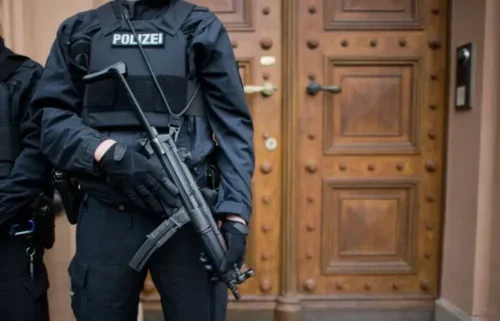
Just when I thought things could not possibly get more shockingly totalitarian in New Normal Germany, where I’m being prosecuted in criminal court (for the second time) for tweeting, the German authorities have gone and surprised me again. No, they haven’t established an actual Nazi-style People’s Court (pictured above) yet, and, of course, there is absolutely no similarity between the current German justice system, which is totally fair and democratic and a paragon of impartial justice and the rule of law, and The People’s Court of Berlin during the Nazi era, nor is there any similarity between Nazi Germany and New Normal Germany (i.e., modern-day Germany), and I would never, ever, suggest that there was, as that would be intellectually lazy, and tasteless, and completely inaccurate, and illegal, and … well, let me fill you in on the latest.
The Berlin Superior Court has set a date for my next thoughtcrime trial. As regular readers will probably recall, my first thoughtcrime trial in January ended with my acquittal. So, the German authorities are putting me on trial again. Yes, they can do that in Germany. But, wait, that’s not the best part.
The best part is, at my new thoughtcrime trial — this time in Berlin Superior Court — full-scale Anti-Terrorism Security protocols will be effect in the courtroom. Everyone will be subjected to TSA-style scanning and screening, and will have to surrender all their personal possessions and hats and coats and head coverings to the Security Staff, and completely empty their pockets of all items, before entering the courtroom. No computers, phones, smart-watches, or any other potential recording devices will be allowed in the courtroom. Pencils and sheets of paper will purportedly be provided to members of the press by Security Staff. Members of the press and public will be limited to 35, and, after they have successfully passed their “security screening,” they will be cordoned off in the last five rows of the gallery in the very back of the courtroom, “for security reasons,” and monitored by the armed Security Staff.
For the benefit of any new readers unfamiliar with me and my case, I am not a terrorist. I’m an award-winning American playwright, novelist, and political satirist. I have lived here in Berlin for 20 years. The German authorities have been investigating and prosecuting me since August 2022. My case has been covered in The Atlantic, Racket News, Neue Zürcher Zeitung, Multipolar, and many other outlets, so I won’t reiterate every little detail again here. Basically, I am being prosecuted for “spreading pro-Nazi propaganda” because I criticized the Covid mask mandates and tweeted the cover artwork of one of my books, The Rise of The New Normal Reich.
Here’s the cover artwork of that book. The other two images are the recent covers of Der Spiegel and Stern, two well-known mainstream German magazines, which are not being prosecuted for “spreading pro-Nazi propaganda.” As anyone (even the German authorities) can see, the Spiegel cover artwork uses exactly the same concept as the cover artwork of my book. The only difference is, the Spiegel swastika is covered by the German flag, whereas the swastika on my book is covered by a medical mask.
As anyone (even the German authorities) can see, the Spiegel cover artwork uses exactly the same concept as the cover artwork of my book. The only difference is, the Spiegel swastika is covered by the German flag, whereas the swastika on my book is covered by a medical mask.
Both artworks are obviously intended as warnings of the rise of a new form of totalitarianism. Der Spiegel was warning about the Alternativ für Deutschland party (AfD) — as was Stern with its swastika floating in a champagne glass. I was warning about what I dubbed “The New Normal Reich,” the new nascent form of totalitarianism that emerged during 2020-2023, which is still very much on the rise, and which is thoroughly documented and analyzed in my book (which book was banned by Amazon in Germany at the same time the German authorities launched a criminal investigation of me and instructed Twitter to censor my Tweets, which Twitter did).
The pretext the Court is citing for ordering these Anti-Terrorism Security protocols at my trial is ridiculous, and infuriating. The Court claims that the courtroom in which my trial is to take place is occasionally used for a certain “high-security” trial. Therefore, according to the Court, my trial must also be subjected to Anti-Terrorism Security protocols. Seriously, the Court sent my attorney a fax setting forth this “explanation,” which is, of course, a load of horseshit. The Berlin Superior Court is a huge building containing multiple courtrooms, one or two which are probably not subject to such Anti-Terrorism Security protocols when “high-security” trials are not taking place within them.

No, the imposition of these Anti-Terrorism Security protocols is clearly a cynical ploy intended (a) to suppress coverage of the trial, (b) to discourage the press and public from attending, and (c) to intimidate and harass me and my legal counsel, and any members of the press and public who nevertheless attend the trial in spite of the “security procedures” they will be subjected to.
This cynical tactic — which is not an official press blackout, because journalists can still attend and attempt to scribble notes on their knees with the pencils and sheets of paper provided by the Security Staff — comes as no real surprise. As I mentioned above, my case and my first trial got a fair amount of attention from the international press, enough to put the Court on notice that my prosecution was being watched. So, it’s no mystery why the German authorities would want to discourage any reporting on my “do-over” trial in Superior Court.
Also, the gallery was filled to capacity at my original trial in January, where I delivered a rather unusual closing Statement to the Court, which was then published and disseminated widely in Germany. So, again, it is no real mystery why the Superior Court wants to discourage members of the public from attending this new trial by threatening to subject them to these humiliating “security” protocols, and why it has limited the gallery size to only 35 seats.
I assume the German authorities — and by “authorities” I mean the Berlin District Prosecutor’s office, the Berlin Superior Court (Der Kammergericht), and whatever other authorities are intent on punishing me, and making an example of me, for daring to criticize the government’s edicts during 2020-2022, i.e., suspension of the constitutional rights, mask mandates, segregation, the banning of protests, etc. — I assume these authorities are particularly motivated to prevent the press from covering this second trial in Superior Court, because, from what I understand of the German legal system, they are going to “do” me (i.e., convict me) this time.
The way the German legal system works, if they want to do you, is (1) you are acquitted in the lower Criminal Court, (2) the District Prosecutor appeals the verdict to the Superior Court, (3) the Superior Court overturns your acquittal, and (4) the prosecution goes back to the original Criminal Court, which stages a new trial, at which you will be found guilty, because, once the Superior Court has overruled your acquittal, the Criminal Court will convict you based on the Superior Court’s ruling. At which point you will appeal. And on and on and on it will go, until you are broke, or until you give up fighting because you are just so fucking exhausted.
I’m not making this up. This is how The People’s Court of New Normal Germany (i.e., the post-Covid German justice system, which, again, bears no resemblance whatsoever to The People’s Court of Berlin in Nazi Germany, or to the courts in the Soviet Union during the Stalin era, or any other totalitarian “justice” system) … this is how it works in New Normal Germany if you are a critic of the authorities and refuse to meekly accept whatever punishment they want to summarily dish out for whatever they deem to be your thoughtcrimes.
But, hey, at least they’re not going to take me out and put me up against a wall and shoot me, like they did with political criminals in Nazi Germany, and the USSR, so I suppose I should be grateful. I’ll have to work on that.
If you think my case is an aberration, it isn’t. There are many, many other people — critics of the government’s “Covid measures” during 2020-2023 — who are being persecuted and made examples of. Most of these people do not have the financial resources to pay lawyers to fight these prosecutions, so they plead guilty to the charges and pay the fines, which are typically much less than what they would face in attorney’s fees. Being somewhat of a public figure, I thought it was my responsibility not to do that. I’m extremely grateful to everyone who has donated to my legal defense fund, which is how I have been able to cover my legal expenses. There’s enough left in that fund to cover this next trial in Superior Court, so I’m OK for now, financially. I mention that because people are already asking how they can send me money.
What people can do, if they want to do something helpful, is make as much noise as possible about what is happening, not just in Germany, but all throughout the West. Because what is happening is, well, what I tried to capture and analyze in my book. The Powers That Be are going totalitarian on us. They are gradually, and not so gradually, phasing out the so-called “liberal” or “democratic” rights and principles that it was necessary to placate the Western masses with during the Cold War era, which it is no longer necessary to do beyond a certain superficial point.
I have published three books of essays documenting this transition to a new global-capitalist form of totalitarianism, so I’m not going to go on and on about it here. But that’s what all the censorship is about. That’s what all the manufactured hysteria, fomented hatred, fanaticism, the permanent state of “emergency” and “crisis,” the “culture wars,” the cults of personality, the bombardment of our minds with absolutely meaningless nonsense, the naked displays of force, the blatant instrumentalization of the justice system to punish political dissidents, not just here in Germany, but throughout the “democratic” West … that is what all this is about.
I’ll keep my readers posted on the details of my upcoming trial in Berlin Superior Court. My attorney is objecting to these “security protocols,” of course. We’ll see how that goes. In the meantime, instead of sending me money this time, maybe try to step back from all the mass hysteria and hatred that we are being inundated with and see the big picture. It isn’t pretty.
Help spread the word about the new totalitarianism, about the phasing-out of our democratic rights. I don’t care which “side” of whatever you are on — Trump, Biden, Palestine, Israel, the culture wars, the cancel campaigns, Covid, Elon Musk, Russia, whatever — and neither do The Powers That Be. Take a step back and try to see the bigger picture … the forest, instead of just the trees. And then make as much noise about it as you can.
We are heading somewhere very ugly … somewhere most of us can’t imagine. Some of us will get there first, but all of us will be there, together, eventually. My story is just one example of what it will be like there, in that ugly place. It isn’t really a story about Germany. It is a story about the end of the myth of democracy, and the rule of law, and all that good stuff. As Frank Zappa once so eloquently explained …
The illusion of freedom will continue as long as it’s profitable to continue the illusion. At the point where the illusion becomes too expensive to maintain, they will just take down the scenery, they will pull back the curtains, they will move the tables and chairs out of the way and you will see the brick wall at the back of the theater.
It’s something to behold, that brick wall is, especially up close and personal. You’ll see when you get here. I’ll save you a seat.
The post
The People’s Court of New Normal Germany first appeared on
Dissident Voice.
This post was originally published on Dissident Voice.















